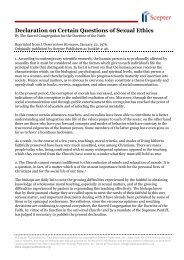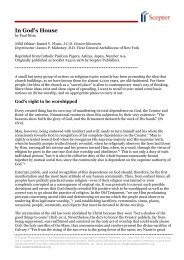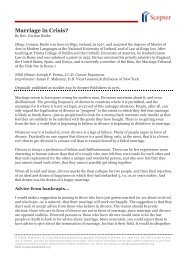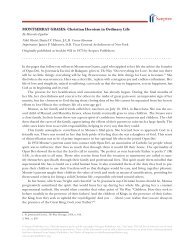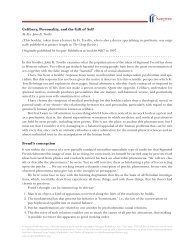Celibacy, Personality, and the Gift of Self Freud's conception
Celibacy, Personality, and the Gift of Self Freud's conception
Celibacy, Personality, and the Gift of Self Freud's conception
Create successful ePaper yourself
Turn your PDF publications into a flip-book with our unique Google optimized e-Paper software.
However, this maturity is achieved only gradually, <strong>and</strong> in a nonlinear manner, through crises that bear carefulwatching, support, <strong>and</strong> guidance so that <strong>the</strong> person who undergoes <strong>the</strong>m may not lose heart <strong>and</strong> fall intoei<strong>the</strong>r unhappiness or infidelity, <strong>the</strong> Scylla <strong>and</strong> Charybdis in <strong>the</strong> journey toward maturity.EgocentrismRare are <strong>the</strong> celibates, <strong>and</strong> even more rare <strong>the</strong> married people, who embark on <strong>the</strong>ir respective undertakingswith a completely undivided heart. All initial affection is infiltrated by egocentrism under more or lesshonorable <strong>and</strong> worthy pretenses: a desire for personal satisfaction, a desire to improve, a desire to fulfillhunger for <strong>the</strong> absolute. The very solicitude for personal holiness, apostolic zeal itself, can be saddled withheavy egoistic burdens which only time, obscurity, <strong>the</strong> prosaicism <strong>of</strong> daily life, <strong>the</strong> aridity <strong>of</strong> <strong>the</strong> law, <strong>the</strong>inflexibility <strong>of</strong> social structures, temptations, disillusionment, <strong>and</strong> loneliness can slowly rectify, bringing <strong>the</strong>imperfect lover to <strong>the</strong> salutary void described by mystic writers as “<strong>the</strong> night <strong>of</strong> <strong>the</strong> senses <strong>and</strong> <strong>of</strong> <strong>the</strong> spirit,”<strong>and</strong> which we can simply call “existential crisis.” <strong>Self</strong>-giving grows <strong>and</strong> is purified only through each person’spersonal history. But he or she who is living through such a crisis must underst<strong>and</strong> that <strong>the</strong>y ought not torun away from it (“One fears <strong>the</strong> abyss because in its depths one finds God” [Simone Weil]) or pretend thatit isn’t <strong>the</strong>re; <strong>and</strong>, above all, he should not deceive himself with an eventual change <strong>of</strong> partner because it ishe who has to change (Fritz Kunkel).The greater number <strong>of</strong> so-called successful marriages are couples who survive <strong>the</strong>se unavoidable shipwrecks,when “ei<strong>the</strong>r <strong>the</strong> ego kills love or love kills <strong>the</strong> ego” (Thibon). The most successful celibates arethose who, through crises <strong>of</strong> greater or lesser extent, have known how to purify <strong>the</strong> initial motives <strong>of</strong> <strong>the</strong>irdedication; it is <strong>the</strong> story <strong>of</strong> many priests whose vocation was decided in minor seminaries, <strong>and</strong> <strong>of</strong> manynuns. We should not split hairs or be too meticulous in facing up to our initial motives so long as <strong>the</strong>se arenot completely devoid <strong>of</strong> au<strong>the</strong>ntic aspects, because o<strong>the</strong>rwise, we would destroy <strong>the</strong> majority <strong>of</strong> pr<strong>of</strong>essional,matrimonial, <strong>and</strong> priestly vocations! A sullied or even heavily tarnished beginning can be rectified,compensated for, <strong>and</strong> purified; this applies also to a celibacy weighed down with sexual taboos <strong>and</strong> fears.Hence <strong>the</strong> need not to isolate <strong>the</strong> sexual problem, not to make <strong>of</strong> it <strong>the</strong> object <strong>of</strong> a separate educationbut to integrate it into <strong>the</strong> general structure <strong>of</strong> <strong>the</strong> personality. Many <strong>of</strong> <strong>the</strong> most highly respected names incontemporary psychiatry have repeatedly stressed this, to <strong>the</strong> point <strong>of</strong> satiety, against <strong>the</strong> widespread—<strong>and</strong><strong>of</strong>ten hypocritical—educational practice aimed at liberation from taboos.Sexuality has its place in <strong>the</strong> loving relationship <strong>of</strong> man with <strong>the</strong> world, i.e., in that mode <strong>of</strong> being-in<strong>the</strong>-worldcalled love, in which <strong>the</strong> oneness <strong>and</strong> <strong>the</strong> totality <strong>of</strong> <strong>the</strong> I <strong>and</strong> <strong>the</strong> You are lived in <strong>the</strong> form <strong>of</strong>self-giving, without reservation <strong>and</strong> without conditions, which shapes all <strong>the</strong> dimensions <strong>of</strong> one’s existence:<strong>the</strong> bodily, <strong>the</strong> psychic, <strong>the</strong> spiritual.Sexuality, according to existential analysts, is love actualized in <strong>the</strong> bodily sphere: a love that can beincarnated or realized ei<strong>the</strong>r in sexual activity or in sexual abstinence. At <strong>the</strong> roots <strong>of</strong> every sexual disturbancewill be found, as we have said, a restriction <strong>of</strong> <strong>the</strong> capacity for love, for various reasons: isolation,stubbornness, introspection, fear, etc. This means that <strong>the</strong> sexual behavior <strong>of</strong> each person does not dependfundamentally on his own constitution, or on <strong>the</strong> social conditions in which he lives. It can always be transformed,provided that <strong>the</strong> individual’s way <strong>of</strong> being-in-<strong>the</strong>-world, i.e., his relationship with himself, with o<strong>the</strong>rs,with life, <strong>and</strong> with God is also adequately transformed.The errors <strong>of</strong> sex educationThese psychopathological premises oblige us to look at <strong>the</strong> complex question <strong>of</strong> sex from <strong>the</strong> viewpoint <strong>of</strong><strong>the</strong> total personality <strong>and</strong> (most importantly) from <strong>the</strong> educational point <strong>of</strong> view. Unfortunately, it should be© Scepter Publishers, Inc. This information protected by copyright <strong>of</strong> Scepter Publishers, Inc., New York, NY USA. It is for <strong>the</strong> free use <strong>of</strong> readers,<strong>and</strong> may be redistributed without permission. None <strong>of</strong> this information can be sold, ei<strong>the</strong>r in electronic or print form, unless permissionhas been obtained from Scepter Publishers, Inc. Direct all inquiries to info@scepterpublishers.org.www.scepterpublishers.org
<strong>and</strong> clear appreciation <strong>of</strong> <strong>the</strong> true, which characterizes all au<strong>the</strong>ntic love. Compared to <strong>the</strong> directness—<strong>the</strong> coarseness <strong>of</strong> manners, if you wish—<strong>of</strong> a Ca<strong>the</strong>rine <strong>of</strong> Siena or a Thomas Aquinas, <strong>the</strong> popularizedfigure <strong>of</strong> an Aloysius Gonzaga—eyes riveted on <strong>the</strong> floor, not once lifted to look his sovereign, Maria<strong>of</strong> Austria, in <strong>the</strong> eye, going even so far as to avoid, if we are to believe <strong>the</strong> Roman Breviary, looking on<strong>the</strong> face <strong>of</strong> his own mo<strong>the</strong>r—such a figure seems to me to possess all <strong>the</strong> earmarks <strong>of</strong> a pious legend orfraud which can edify no one.4. Restrictive pedagogy: In its view, if a person is chaste, <strong>the</strong>n everything is all right. Such a simplificationevidences extremely bad <strong>the</strong>ology <strong>and</strong> psychology <strong>and</strong> is also devoid <strong>of</strong> any sense <strong>of</strong> reality. If we lose sightboth in our living <strong>and</strong> in our teaching <strong>of</strong> <strong>the</strong> fact that <strong>the</strong> sole valid summary <strong>of</strong> God’s Law is embodiedin <strong>the</strong> love <strong>of</strong> God <strong>and</strong> <strong>the</strong> love <strong>of</strong> neighbor <strong>and</strong> insist instead on <strong>the</strong> more or less <strong>the</strong>oretical primacy <strong>of</strong>chastity, we may have persons who are continent but certainly not chaste. We shall have frustrated <strong>and</strong>embittered celibates, encrusted with a melancholic punctiliousness <strong>and</strong> with an all-pervading distrust <strong>of</strong><strong>the</strong> world that <strong>of</strong>ten foments <strong>the</strong> worst <strong>of</strong> all evils, that is, spiritual pride, which will sooner or later bringabout <strong>the</strong> dramatic short circuit that plunges <strong>the</strong> aspirant to angelhood into <strong>the</strong> mire <strong>of</strong> carnality.The meaning <strong>of</strong> life <strong>and</strong> self-givingSexual education reduces in <strong>the</strong> last instance to an adequate explanation <strong>of</strong> <strong>the</strong> true meaning <strong>of</strong> sexuality.At this point we need to liberate ourselves decisively from <strong>the</strong> formulism <strong>and</strong> legalism that life itself inevitablydiscards. We have to go directly to <strong>the</strong> problem <strong>of</strong> “meaning.” All <strong>of</strong> Frankl’s teaching on <strong>the</strong> “meaning<strong>of</strong> life” obtains here indisputable validity. If <strong>the</strong> whole <strong>of</strong> life acquires meaning only within <strong>the</strong> ambit <strong>of</strong>“serving” <strong>and</strong> “loving,” this should be much truer <strong>of</strong> <strong>the</strong> life <strong>of</strong> him who gives himself without any egoisticballast—desire <strong>of</strong> recognition, or self-satisfaction, or self-development, or personal success. Chastity, saidThomas Aquinas, is not praiseworthy in itself, but only inasmuch as it leads one to <strong>the</strong> contemplation <strong>of</strong>things divine. For instance if, in a future priest, <strong>the</strong> life that is hidden with Christ in <strong>the</strong> God <strong>of</strong> <strong>the</strong> NewCovenant is not awakened <strong>and</strong> fostered, if he fails to become above all else a man <strong>of</strong> prayer aflame with <strong>the</strong>desire to see God already in this world, in things, in <strong>the</strong> most disinherited <strong>of</strong> our fellow men <strong>and</strong> women—for it is in this contemplation that <strong>the</strong> disclosure <strong>of</strong> <strong>the</strong> meaning <strong>and</strong> <strong>the</strong> ultimate foundation <strong>of</strong> his wholelife is effected—<strong>the</strong>n he will have failed to achieve a positive <strong>and</strong> outward looking celibacy.The meaning <strong>of</strong> celibacy cannot be grasped except in dialogue with God himself, clamoring for <strong>and</strong>imploring <strong>the</strong> grace needed to continue <strong>the</strong> struggle which dem<strong>and</strong>s a constant renewal <strong>of</strong> <strong>the</strong> desire toaccept <strong>the</strong> blind adventure when confronted with <strong>the</strong> sc<strong>and</strong>al <strong>and</strong> folly <strong>of</strong> <strong>the</strong> cross <strong>and</strong> <strong>of</strong> <strong>the</strong> Gospel.This folly <strong>and</strong> sc<strong>and</strong>al are even more evident in our days. Contemporary demythifying, desacralizing,secularizing tendencies—which would turn Christ into a mere humanitarian hero, Christianity into merehumanism, <strong>and</strong> priests into mere social workers are complemented by <strong>the</strong> so-called “sexual revolution”modeled on <strong>the</strong> views <strong>of</strong> <strong>the</strong> heterodox Viennese psychoanalyst Wilhelm Reich. He preached with a fanatic’szeal <strong>the</strong> abolishment <strong>of</strong> all transcendent values, <strong>of</strong> all marriage morals, <strong>of</strong> all authority <strong>of</strong> any sort, so that“sexual happiness” might eliminate as if by magic all wars, repressions, <strong>and</strong> neuroses.If Catholics allow <strong>the</strong>mselves to be led by <strong>the</strong> nose thanks to a somewhat naive conformism, <strong>and</strong> bow to<strong>the</strong> myth <strong>of</strong> total secularization <strong>and</strong> scientific redemption from all evil, it should not be at all surprising that<strong>the</strong>y too should take up <strong>the</strong> “long march” to SexualgIiick (sexual happiness). Some time ago a pamphletpublished by a Viennese Catholic student group attacked monogamous marriage <strong>and</strong> defended “groupmarriage” because <strong>the</strong> latter is “more natural <strong>and</strong> more human.” O<strong>the</strong>rs are advocating that so-called marriagebetween homosexuals ought to be not only legally recognized but counted as a sacrament.© Scepter Publishers, Inc. This information protected by copyright <strong>of</strong> Scepter Publishers, Inc., New York, NY USA. It is for <strong>the</strong> free use <strong>of</strong> readers,<strong>and</strong> may be redistributed without permission. None <strong>of</strong> this information can be sold, ei<strong>the</strong>r in electronic or print form, unless permissionhas been obtained from Scepter Publishers, Inc. Direct all inquiries to info@scepterpublishers.org.www.scepterpublishers.org
A dolce stil nuovo (sweet new style) in <strong>the</strong>ologyCertain <strong>the</strong>ologians, bright-eyed with enthusiasm from <strong>the</strong>ir fresh discovery <strong>of</strong> <strong>the</strong> positive value <strong>of</strong> sexuality—<strong>of</strong>which <strong>the</strong>y show only scant knowledge—have idealized marriage to such an extent that celibacy,in <strong>the</strong>ir eyes, seems no better than an incurable wound. The erotic lyricism <strong>of</strong> this “dolce stil nuovo teologico”(sweet new <strong>the</strong>ological style) that presents marriage as <strong>the</strong> indispensable means for <strong>the</strong> development <strong>of</strong> <strong>the</strong>personality <strong>and</strong> its social possibilities, is a big lie from <strong>the</strong> viewpoint <strong>of</strong> psychology, not to mention <strong>the</strong> aspersionit casts on <strong>the</strong> only perfectus homo (perfect man) <strong>and</strong> sole redeemer <strong>of</strong> <strong>the</strong> world, Jesus Christ. <strong>Celibacy</strong>deprives a man <strong>of</strong> many joys. No one denies it. But, on <strong>the</strong> o<strong>the</strong>r h<strong>and</strong>, it allows commitment, achievements,diversions, <strong>and</strong> joys unknown to <strong>the</strong> married. That, too, is undeniable.The celibate, who has embraced celibacy in view <strong>of</strong> a full commitment to o<strong>the</strong>rs, becomes a greatteacher <strong>of</strong> love, not excluding conjugal love, because he or she has achieved in his or her own life that whichmarriage is only a symbol <strong>of</strong>, which is <strong>the</strong> nuptial union between Christ <strong>and</strong> <strong>the</strong> Church.Without this “mystical” foreshadowing <strong>and</strong> anticipation <strong>of</strong> man’s final condition in eternity, <strong>the</strong> ultimatemeaning <strong>of</strong> celibacy is lost <strong>and</strong> all o<strong>the</strong>r substitute compensations eventually turn out to be painfully insufficient.Thus, priests <strong>and</strong> <strong>the</strong>ologians who truly want to help in promoting public health should dedicate<strong>the</strong>mselves less to psychology <strong>and</strong> sociology <strong>and</strong> more to mysticism. It is here that <strong>the</strong> foundations <strong>of</strong> <strong>the</strong>Christian calling, <strong>and</strong> much more <strong>of</strong> <strong>the</strong> priestly calling, are to be found.However, this mustn’t be taken to mean that a positive celibacy solidly anchored in spirituality <strong>and</strong> emotionalmaturity can be free to prescind from asceticism. A well-integrated sexuality, <strong>the</strong> exercise <strong>of</strong> whichhas been renounced, should not be voluntarily stimulated under cloak <strong>of</strong> pharisaical calculations <strong>of</strong> whatis forbidden <strong>and</strong> what is allowable. There is no need to be masochists to perceive that, even in a world lesseroticized than our own, <strong>the</strong> custody <strong>of</strong> <strong>the</strong> senses is necessary for anyone who wishes to live chastely incelibacy—or in marriage. No anti-repressive taboo can convince me <strong>of</strong> <strong>the</strong> possibility <strong>of</strong> a celibate life withouteffort, without sobriety, without control over <strong>the</strong> imagination, <strong>and</strong> without reasonably measured bodilypenances. At any rate, <strong>the</strong> more important discipline is that <strong>of</strong> <strong>the</strong> cross imposed by <strong>the</strong> love <strong>of</strong> neighbor,<strong>and</strong> all <strong>the</strong> renunciations, efforts, humiliations, failures, <strong>and</strong> ingratitude implicit in <strong>the</strong> service <strong>of</strong> o<strong>the</strong>rs. All<strong>the</strong>se things serve to help us rectify our intentions <strong>and</strong> seek God in <strong>and</strong> above all things.All <strong>of</strong> it is even truer, as I once heard Josemaría Escrivá, <strong>the</strong> founder <strong>of</strong> Opus Dei, say <strong>of</strong> <strong>the</strong> priest whoseriously fulfills <strong>the</strong> commitments contracted by his ordination. He will have no time to spare for <strong>the</strong> luxury<strong>of</strong> indulging in personal problems. At night, weary from so much self-giving, he will make <strong>the</strong> astonishingdiscovery that all day long he has not had one minute in which to think <strong>of</strong> himself <strong>and</strong> can in consequencehappily exclaim: I live, yet not I, but Christ lives in me.The AuthorJohn B. Torello is a doctor specializing in psychiatry, <strong>and</strong> he also has a doctorate in <strong>the</strong>ology. Ordained apriest in 1948, he has combined his intense pastoral commitment with various interests in <strong>the</strong> field <strong>of</strong> hismedical specialty. He was a pr<strong>of</strong>essor <strong>of</strong> psychology at <strong>the</strong> Higher Institute <strong>of</strong> Sociology in Palermo (Italy),<strong>and</strong> pr<strong>of</strong>essor <strong>of</strong> pastoral psycho-pathology <strong>and</strong> spiritual director at <strong>the</strong> major seminary in <strong>the</strong> same city. Hehas also worked in Zurich <strong>and</strong> Milan. For a number <strong>of</strong> years now he has been residing in Vienna.Fr. Torello is <strong>the</strong> author <strong>of</strong> a number <strong>of</strong> books, articles, <strong>and</strong> essays published mostly in Italian <strong>and</strong> German.Psychoanalysis <strong>and</strong> Confession (1963) <strong>and</strong> Open Psychology (1972) are two <strong>of</strong> his better known works.© Scepter Publishers, Inc. This information protected by copyright <strong>of</strong> Scepter Publishers, Inc., New York, NY USA. It is for <strong>the</strong> free use <strong>of</strong> readers,<strong>and</strong> may be redistributed without permission. None <strong>of</strong> this information can be sold, ei<strong>the</strong>r in electronic or print form, unless permissionhas been obtained from Scepter Publishers, Inc. Direct all inquiries to info@scepterpublishers.org.www.scepterpublishers.org



